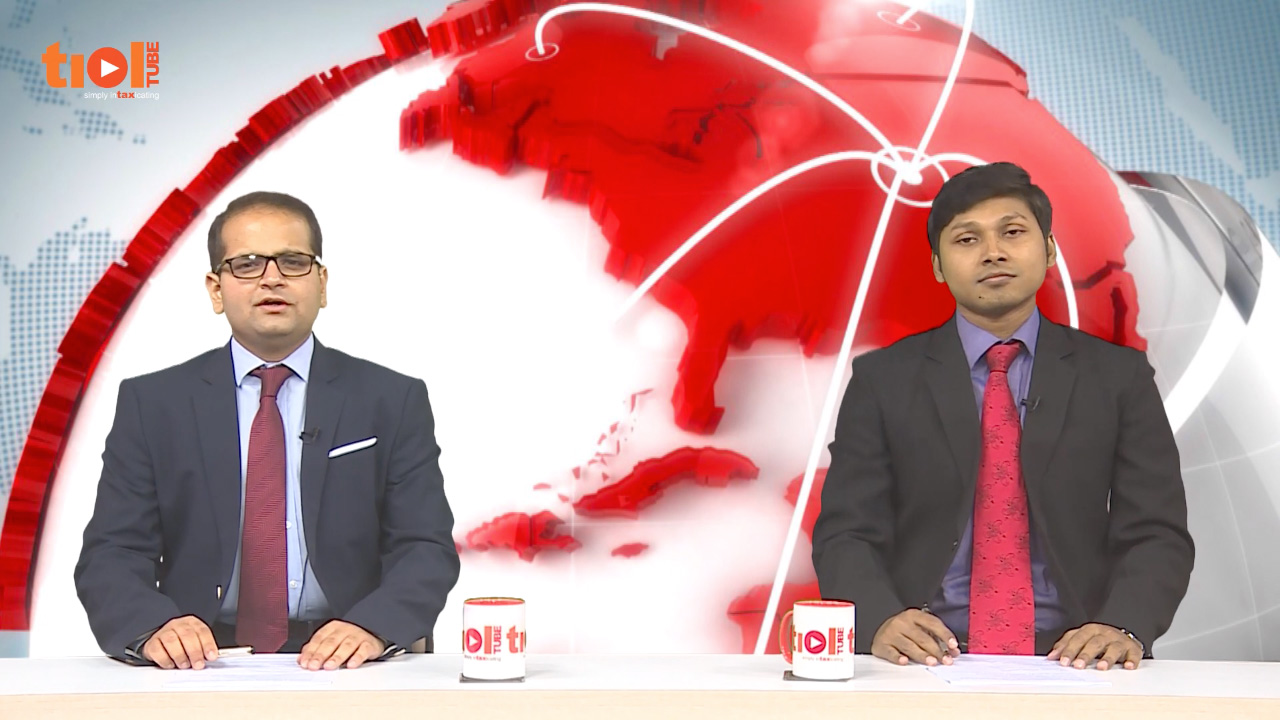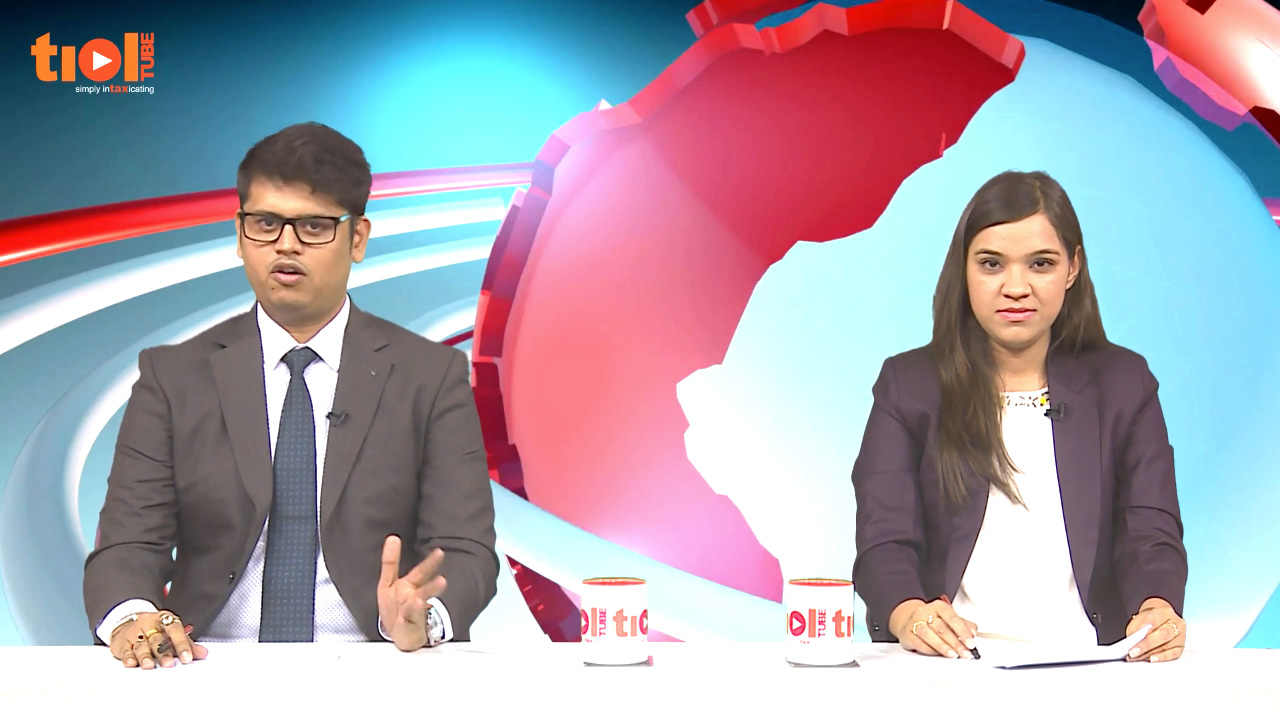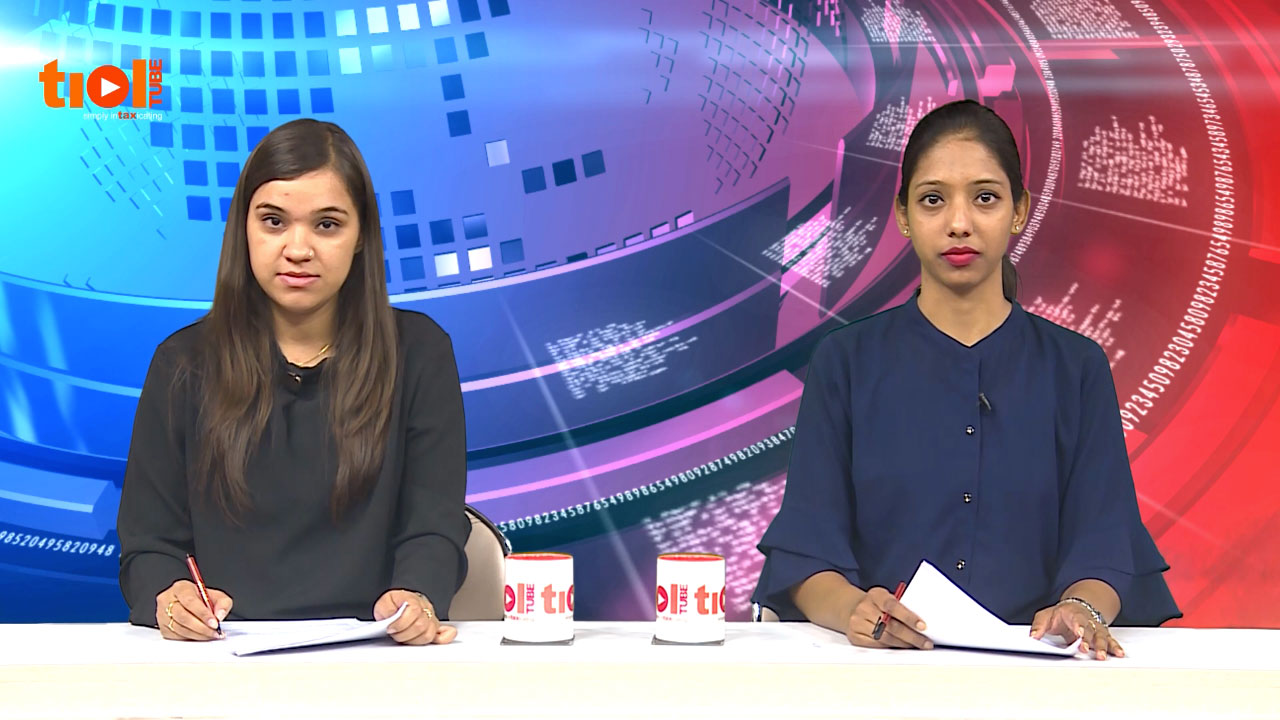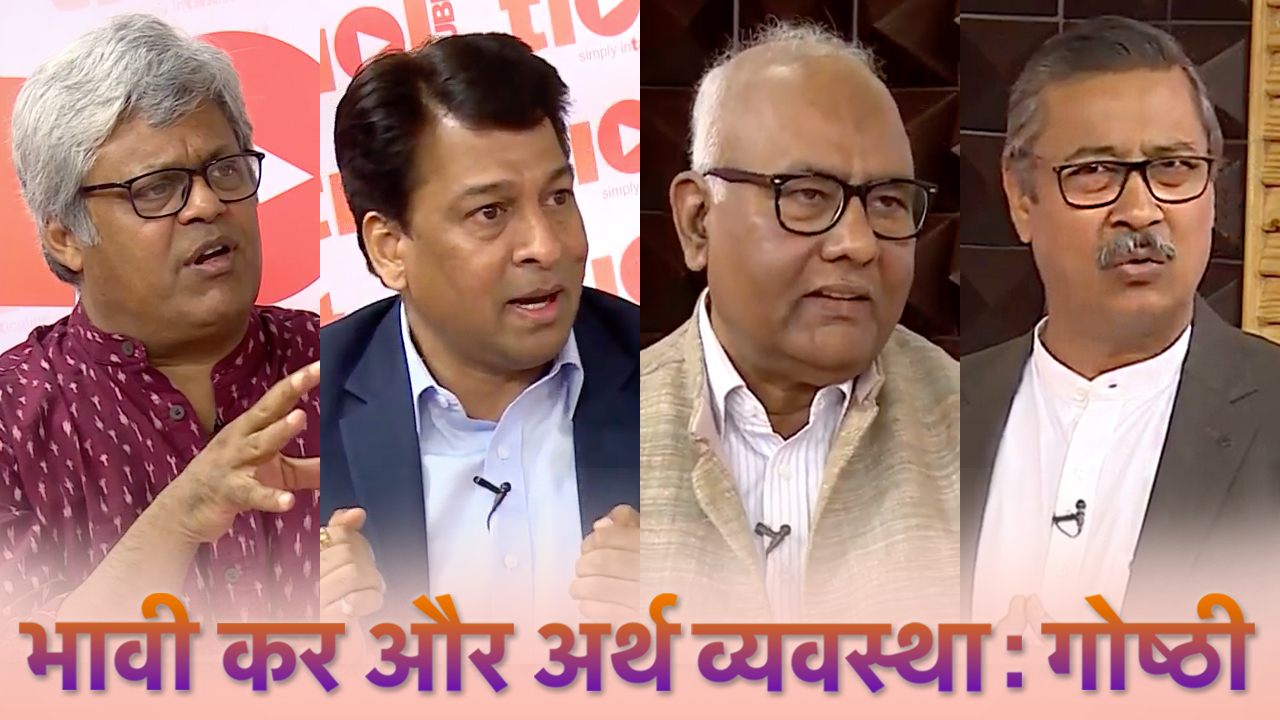|
SERVICE TAX
2019-TIOL-1463-CESTAT-DEL Mjr Steels Pvt Ltd Vs CCE & ST
ST - During the course of audit it was noticed that the appellant had not paid service tax on the freight charges paid to the transporters during the period from 2007-08 - Although it was mentioned that freight is being paid by their Head office at Howrah, Kolkata but appellant could not produce copy of centralized registration or other evidence to show that service tax on GTA pertaining to Jaipur Branch has been paid by their Head office - demand issued and confirmed/upheld - appeal to CESTAT.
Held: There is no evidence of centralized registration being produced by the appellant - Also, the documents tendered are insufficient to prove that Kolkata office has discharged the liability of Jaipur office as has also been observed by the adjudicating authorities - no infirmity insofar as confirmation of the demand is concerned - entire amount of service tax of Rs. 14,11,306/- demanded from the appellants alongwith interest thereon had been deposited much earlier than the date of issuance of SCN - it cannot be alleged that the appellant had committed an act of non-payment of service tax by reason of fraud, collusion or any wilful mis-statement or suppression of facts etc. - no penalty can be imposed under any of the provisions of the FA, 1994 - Appeal partly allowed: CESTAT [para 5 to 7]
- Appeal partly allowed: DELHI CESTAT
2019-TIOL-1444-CESTAT-KOL
IMRB International Vs CST
ST - The assessee-company is engaged in rendering services falling under Market Research Agency Service - It obtained registration under such category and rendered services to clients in India and abroad - Such services were also rendered to clients located in Nepal - For such services provided to clients abroad, the assessee recovered consideration in two parts - (a) one set of bills being issued for recovering project cost including operating expenses, time cost, profit, communication expenses, traveling expenses; (b) bills raised for actuals which included expenses incurred on travel & stay, hiring of stalls, gift and product samples - The assessee paid tax on amounts recovered under project cost while no tax was paid on amounts recovered under the actuals - The Revenue opined that amounts recovered under the latter heading must also be included in the consideration for payment of service tax under Market Research Agency Service - SCN was issued proposing to recover duty for the relevant period - The Revenue also noted that for the services provided to clients in Nepal, consideration was received in Indian Rupees - Hence SCN was issued alleging that no tax was paid on amounts received from foreign clients & proposing duty for the same - The Revenue also observed that the assessee availed Cenvat credit of service tax paid which was not allowable because such credit had been availed based on photo copies of the relevant bills and that certain bills were not in the assessee's name - On adjudication, duty demands were raised with interest & penalties u/s 76, 77 & 78 of the Finance Act 1994 - Hence the present appeal.
Held: Reimbursement of out of pocket expenses - Such amount was received for hiring hotel rooms, gifts & purchasing product samples - The issue of whether reimbursable expenses form part of taxable value stands settled by the Apex Court in Union of India Vs. Intercontinental Consultants and Technocrats Pvt. Ltd wherein it was held that value of taxable services u/s 67 did not include reimbursable expenses for providing such service until when Section 67 was suitably amended to provide for the same - Hence the duty demand raised on this count is set aside: CESTAT (Para 6)
Held: Service tax on amounts received from foreign clients - The Notfn No 06/99 in this regard carried out a proviso to the effect that exemption is not available when payment is received in India in forex for taxable services repatriated & sent outside India - For services rendered for foreign clients, the appellants received payments in forex when customers are situated in countries other than Nepal - Nepal-based customers made payment in INR currency as permitted by the RBI - The appellant remits forex for purchasing software license as well as for expenses in connection with providing the service in foreign countries - The Adjudicating Authority considered such payments 'sent outside India' and directed payment of service tax for the entire amount received from foreign clients which includes those in Nepal - Evidently, the payment for services provided to foreign clients have been received & such amounts will not attract service tax since they constitute Export of Services - The appellant made certain remittances in forex for purchasing software licenses & other expenses pertaining to services provided to foreign clients - Such remittances will not incur the mischief of the proviso to Notfn No 6/99 & Notfn No 21/03 - Hence in any case, the assessee is fully entitled to make remittances in forex outside India for legitimate business expenses as permitted by the RBI - Hence the Tribunal has no jurisdiction to direct payment of service tax on the export proceeds - This view stands fortified by the decision in the case of SGS India Pvt. Ltd. Vs. CST - 2011-TIOL-666-CESTAT-MUM: CESTAT (Para 6)
Held: Disallowance of Cenvat credit - Substantial part of credit is disallowed on grounds of having been availed based on photocopies of the original documents - The assessee claimed that the original documents have been retained in the respective Regional Office - Besides, neither any allegation of fraud or misuse has been made nor any doubts cast on the authenticity of the photocopies based on which credit has been availed - Denial of credit on such flimsy grounds is untenable: CESTAT (Para 6)
- Assessee's appeal allowed: KOLKATA CESTAT
2019-TIOL-1443-CESTAT-AHM
CCE & ST Vs Murlidhar Horticulture Pvt Ltd
ST - The respondent-assessee is engaged in maintenance of gardens, which includes work relating to lawn, hedge & shrubs - Such services are exclusively provided to M/s Reliance Industries Ltd at different sites - Duty demands were raised under Management, Maintenance and Repair Services - On adjudication, the demands for the period prior to 01.07.2012 were dropped on grounds that the activity was not classifiable under MMR service - However, the demands for post 01.07.2012 were confirmed on grounds that the service was not covered under the Negative list - On appeal, the Commr.(A) noted that the activity involved maintenance and development of garden, trees, pots and cutting and sampling of plants, trees, grass, water, fertilizer - Hence it was held that such activity was classifiable under Agricultural activities - Hence the Revenue's appeal.
Held: Considering the definition of Management, Maintenance and Repair Services nowhere leads to the inference that the assessee's activities fall under this definition - The property involved should be movable or immovable - Section 3 of the Transfer of Property Act 1882 defines immovable property as not including timber, growing crops or grass - Admittedly, the assessee's activities do not fall under this category and are not classifiable under this heading: CESTAT (Para 5,6)
Held: Agriculture - The same has been defined u/s 65B(3) of the Finance Act 1994 to include the cultivation of plants and rearing of all life forms of animal, except the rearing of horses, for food, fiber, fuel, raw material or other similar products - Moreover, the Negative List under Section 66D(d) of the Finance Act 1994 exempts services related to production of any agriculture produce including cultivation, harvesting & Threshing plant protection - Hence the cultivation of plants and their protection is included in scope of Agriculture - Moreover, the term 'Horticulture' means to provide for plant conservation, landscape restoration, landscape restoration and landscape & garden designing, maintenance - The term 'agriculture' has a very wide compass and covers 'horticulture' as well, which in turn covers gardening in its scope - In this regard, the Apex Court in Kasturi (Dead) by Lrs Vs. Gaon Sabha (1989) 4 SCC 45 held that in the absence of a statutory definition, the meaning in the common parlance would have to be adopted - Hence the activity undertaken by the assessee falls under the definition of horticulture, which is part of agricultural activity only & is not liable for any service tax - Moreover, as the issue is one of interpretation, the extended period of limitation cannot be invoked to raise duty demand - Besides, the Revenue adduced no evidence to show that there was any deliberate intent to evade payment of duty - Hence the demands are hit by limitation as well: CESTAT (Para 1,5,6,8,9)
- Assessee's appeal allowed: AHMEDABAD CESTAT
CENTRAL EXCISE
2019-TIOL-1467-CESTAT-AHM
Milestone Industries Vs CCE
CX - Issue of liability of cast iron powder to duties of excise was not free from doubt even among the tax authorities - Consequently, the benefit of doubt is to be extended to the appellant – penalty set aside while upholding duty demand: CESTAT [para 2, 5, 6]
- Appeal partly allowed: AHMEDABAD CESTAT
2019-TIOL-1466-CESTAT-BANG
CX - Setting-up of ETP is a statutory requirement for carrying out the manufacturing activity and, therefore, the ETP is an integral part of manufacturing setup and setting-up of the ETP is covered under the scope of 'input service' as defined in CCR, 2004 - Insurance undertaken in the present case relates to 'commercial general liability insurance' which covers the general business risk and not for coverage of claims related to accidents and to personal injury and personal medical expenses – Credit admissible on both services – impugned orders set aside and appeals allowed: CESTAT [para 6]
- Appeals allowed: BANGALORE CESTAT
2019-TIOL-1465-CESTAT-ALL
Merino Industries Ltd Vs CCE
CX - Installation activity has nothing to do with the manufacture of the furniture and as such, the installation charges would not form part of the assessable value of the furniture manufactured by the assessee - impugned order set aside and appeal allowed with consequential relief: CESTAT [para 3]
- Appeal allowed: ALLAHABAD CESTAT
2019-TIOL-1464-CESTAT-DEL
National Engineering Industries Ltd Vs CCE & ST
CX - Cenvat Credit with respect to the Service Tax paid qua the services of security guard for providing security of guest house, cycle stand and residential premises outside the factory premises has been denied for want of these services to not to qualify the definition of input services – appeal to CESTAT.
Held: Definition of Input Service under rule 2(l) of CCR, 2004 is not at all restrictive in nature confining itself to the services specifically availed for manufacturing activities, but stands extended to the services, which are having any nexus either direct or indirect to the activity of manufacture of the dutiable product – Credit admissible in respect of the impugned services – order set aside and appeal allowed: CESTAT [para 6, 7]
- Appeal allowed: DELHI CESTAT
2019-TIOL-1442-CESTAT-AHM
AIMS Industries Ltd Vs CCE & ST
CX - The issue at hand is as to whether the retention/detention charges recovered by the assessee beyond the stipulated time period is required to be included in the transaction value of the gas sold in the packed cylinders - Duty demand was raised against the assessee in this regard.
Held: The issue at hand is no longer res integra and stands resolved in a catena of judgments - Retention or detention charges do not form part of the sale price & the same is charged only when the customers retain the cylinders beyond the period stipulated by the assessee - Hence such charges cannot be included in the transaction value of the excisable goods - Hence the demands merit being quashed: CESTAT
- Assessee's appeals allowed: AHMEDABAD CESTAT
2019-TIOL-1441-CESTAT-MAD
Larsen And Toubro Ltd Vs CCE
CX - The assessee-company sold petroleum dispensing pumps and systems unit to GVR as a going concern under Business Transfer Agreement - The assessee then applied for de-registration of PDP facility to enable GVR to apply for registration - The ownership over the goods was transferred under the BTA to the new owner, albeit inputs, capital goods, partially processed goods & finished goods were not physically removed - On directions from the jurisdictional Central Excise commissionerate, the duty liability for the PDP unit was discharged by reversing credit in respect of inputs & capital goods transferred under the BTA - Such reversal was made under protest - Later, the assessee filed claim for refund of such duty paid under protest, on grounds that duty liability arose on finished goods and credit liability on inputs & capital goods arose only when the goofs are physically removed from the factory but continue to remain within the factory & there is no physical removal of the goods from the factory - SCN was issued rejecting such refund - On adjudication, the proposals made in the SCN were confirmed on grounds that rejection of refund was on merits as per Section 11B - On appeal, the Commr.(A) held that the refund claim was premature when filed before the Asst Commr., and that the Asst Commr. could not sit in judgment over the directions issued by the Commissioner - Hence the rejection of refund was sustained - Thus the present appeals.
Held: The assessee correctly asserts that the Commr.(A) exceeded the parameters of the SCN, which does not delve into the assessee's eligibility to file refund claim - In effect, the SCN did not find fault with the filing of the refund claim but only proposed to reject it predominantly on grounds that even if inputs & capital goods have not been physically removed out of the factory, the term removal u/r 3(5) of CCR cannot b e interpreted to mean merely restricted to the physical removal of the goods - On this premise only, the SCN proposed that the assessee discharge its duty liability by reversing credit & there cannot be any refund claim - The O-i-O closely follows the contours of the SCN - It is also not the case that the Revenue was aggrieved with the issue of SCN on these lines or for that matter, the decision of the original authority following the SCN & had filed an appeal to the Commr. (A) against such order - Hence the matter warrants remand so as to be addressed by the adjudicating authority once again: CESTAT (Para 1,5.1,5.5)
- Case remanded: CHENNAI CESTAT
CUSTOMS
2019-TIOL-1093-HC-DEL-CUS
Zhinet Banu Nazir Dadany Vs UoI
Cus - Gold bars weighing 3732.48 gms was assessed at Rs. 93,34,783/- and were seized under Section 110 of the Customs Act, 1962 (Act) on the ground that they were attempted to be imported into India illegally and cleared without payment of customs duty and therefore liable for confiscation - Petitioner, a Kenyan national had filed the present petition in the year 2018 seeking the return of gold brought by her to India and which was seized by the Customs authority on 5th January 2015 at the IGI International Airport, New Delhi - Petitioner had in her statement stated that the gold had been purchased by her in Nairobi by selling a car and taking loan; that she was a home maker; that she proposed to use the same for making jewellery in India and then take the jewellery back to Kenya to sell for profit; that she offered to produce proof of the source of the money for purchasing the gold - petition first came up for hearing on 2nd May, 2018 and then on 9th May, 2018 and at the request of counsel for the Respondent, since he wanted time for instructions, it was asked to be listed on 16th May 2018 - noting that it is apparent that there is lack of communication and proper instructions are not being given to the counsel for the respondent-DRI, the matter was relisted on 6th August 2018 when further time of four weeks was given to file counter-affidavit - On 10th October, 2018 counter affidavit was permitted to be filed subject to the Respondents depositing Rs.20,000/- as costs - Again, time was extended for that purpose on 30th November, 2018 and the case was adjourned to 11th February, 2019 - On 15th January 2019, an adjudication order was passed by the Commissioner of Customs (Airport and General), confiscating the seized gold and imposing the penalty of Rs.18 lacs on the Petitioner under Sections 112 and 114 AA of the Act - case was listed on 11th February 2019 and was adjourned to 17th May 2019 - it was also averred in para 4 of the counter affidavit that an SCN dated 30th June, 2015 was issued; that vide letter dated 19.11.2015 High Commission of India, Kenya stated that the petitioner "no longer resides at the physical address provided; that after providing the petitioner ample opportunities to attend personal hearings and support her claims, the case has been adjudicated vide Order-in-Original No.08/AS/JC/2019 dated 15.01.2019 passed by the Joint Commissioner of Customs, IGI Airport, New Delhi; that as per available records, the case property has been already disposed of in accordance with the provisions of Section 110 (1A), (1B) and (1C) of the Act - On 1st March, 2019 the Petitioner filed CM No. 16718/2019 for an early hearing of the petition pointing out that it was only with the counter affidavit that the above order in original dated 15th January, 2019 was received by the Petitioner and even that order was incomplete as seven pages were missing therefrom; that the SCN had not been served on the Petitioner as contemplated under Section 153 read with Section 110 of the Act; that the SCN should have been served/received within six months from the date of seizure of gold; that in the criminal case instituted in the Court of the Chief Metropolitan Magistrate, Patiala House Court, the Petitioner had attended hearings from 2015 till 2019; that even during that time no SCN was served; that the procedure for disposing of the seized gold was not followed and that was illegal.
Held: Record reveals that the seizure of the gold was made on 5th January, 2015 and a SCN had to be served within a period of six months thereafter in terms of Section 110 (2) read with Section 124(1)(a) of the Customs Act and which is a mandatory requirement; that in view of the apex court decision in Chaganlal Gainmull v. Collector of Central Excise if the SCN was not issued within six months from the date of seizure the consequence would be that the person from whom the gold was seized would become entitled to its return - Even the adjudication order in the present case would be illegal as the Commissioner passed the same ex parte without the SCN having been actually served upon the present Petitioner at all in the present case - second illegality committed is the disposal of the seized gold without notice having been issued to the Petitioner - There is no explanation offered by the Respondents as to why they were constrained to dispose of the seized gold, when it was neither perishable nor hazardous - Also, there is no answer why it had to be disposed of without notice being issued to the person from whom it was seized and which is irrespective of whether the SCN was served or not - In the present case with the seized material not being perishable, being gold bars, there was no reason for the Respondents to have hurriedly disposed it off and that too without notice to the Petitioner - When it was plain that even the SCN was not served upon the Petitioner, there was no reason to proceed with disposal of the seized gold without notice - It also appears that the Respondents hurriedly went ahead and passed an adjudication order more than four years after the gold was seized only after the present petition was filed - As pointed out by the Petitioner, during the time when the proceedings were in progress before the criminal court and the Petitioner was also attending those proceedings, no attempt was made to serve a copy of the SCN upon her there - The entire manner in which the Respondents have proceeded to pass the adjudication order and also dispose of the gold without notice to the Petitioner leaves no doubt that not only the disposal of the seized gold, but the adjudication order as well, are both unsustainable in law - adjudication order dated 15th January, 2019 is hereby set aside - As far as the return of the seized gold is concerned, the Court has been presented with a fait accompli, with the Respondents already having hurriedly disposed of the said gold - on instructions Counsel for UOI states that the proceeds collected during the auction were equal to the value of the gold being an amount of Rs.93,34,783/- - Court accordingly directs that the Respondents will refund to the Petitioner the aforementioned sum of Rs.93,34,783/- (or the precise amount recovered by the Respondents by auction/sale proceedings) not later than 30th June 2019 failing which the Respondents will pay simple interest at 6% p.a. on the said sum for the period of delay - Petition allowed: High Court [para 18 to 26]
- Petition allowed: HIGH COURT OF DELHI 2019-TIOL-1440-CESTAT-DEL
CC Vs AAA Impex
Cus - The dispute is regarding the valuation of goods imported by assessee - The Assessing Authority re-assessed the imported goods at values higher than what was declared by assessee in the Bill of Entry for self assessment - Perusal of records of case indicates that the only reason cited reason for re-assessment of value is that the assessee has accepted the enhanced value - No doubt acceptance of enhanced value in writing waives the requirement of issue of speaking order under Section 17(5) ibid - However, the requirement of Section 14 and Customs Valuation Rules need to be satisfied for enhancement of value - Nothing is forthcoming in the record of the case from which the basis for such re-assessment can be made out - Revenue has vehemently argued that the Customs Authorities were justified in enhancement of value since the importer had accepted such enhancement - In spite of admission on behalf of the importer, Revenue is required to satisfy the requirements prescribed under Section 14 of Customs Act read with Customs Valuation Rules before any enhancement of valuation - It has been argued that Revenue did not record the basis for such enhancement since the requirement of speaking order was waived by importer - The matter is remanded to the Original Assessing Authority for sharing the basis for such re-assessment with the importer: CESTAT
- Matter remanded: DELHI CESTAT |
|








